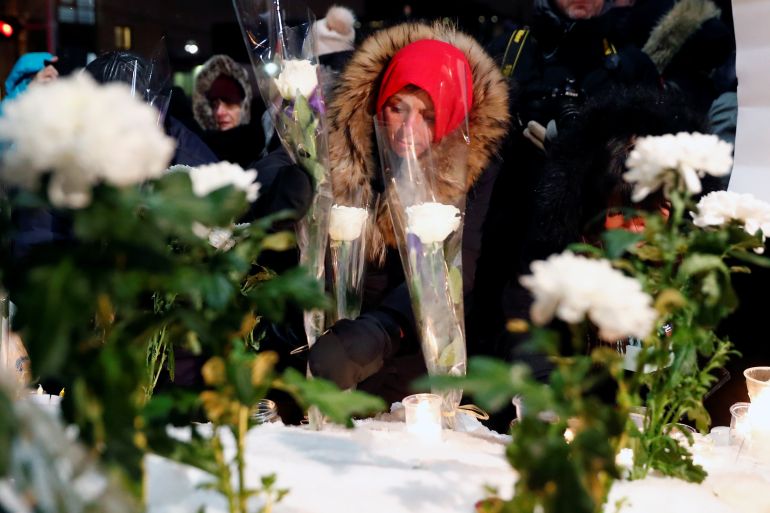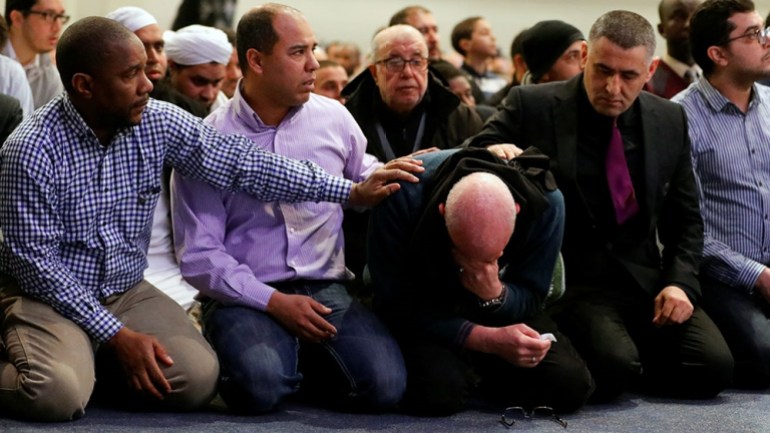Four years after Quebec mosque attack, a promise ‘not to forget’
‘It feels like it was yesterday’, says co-founder of Canadian mosque where six Muslim worshippers were killed in 2017.

Montreal, Canada – Four years have gone by since a gunman stormed a mosque in Quebec City, Canada, killing six people and injuring several others. But Boufeldja Benabdallah says the passage of time has not made the pain go away.
“It still feels like it was yesterday,” said Benabdallah, co-founder and spokesman of the Quebec Islamic Cultural Centre, where the deadly attack took place on January 29, 2017.
Keep reading
list of 3 itemsToronto Muslims want mosque attacks investigated as hate related
Court reduces sentence for Quebec City mosque attacker
Six men were killed in the rampage, which sent shockwaves across Canada and prompted mass vigils and promises from the highest levels of government to tackle Islamophobia and racism.
The attacker, Alexandre Bissonnette, pleaded guilty in 2018 to six counts of first-degree murder and six counts of attempted murder and was sentenced in 2019 to life in prison without the possibility of parole for 40 years.
In November, a Quebec court ruled he could apply for parole in 25 years.
Benabdallah told Al Jazeera that a year after the attack, he had asked the families of the six men who were killed if annual commemorations made them feel uncomfortable.
“They were unanimous in saying, ‘No, we want commemorations to happen every year – to not forget our husbands, to not forget those who were injured, to not forget us, and to not forget the mosque.'”
This year, with COVID-19 surging across Canada, the sombre anniversary will be marked primarily through virtual events. A physically distanced rally in Montreal, the largest city in Quebec, is also planned.
The commemorations provide a chance to examine the root causes of the attack and push for concrete changes to prevent similar events from happening again, said Yusuf Faqiri, Quebec director for the National Council of Canadian Muslims (NCCM).
“This day needs to be recognised to know what hate can do,” he told Al Jazeera.
On Thursday, Canada announced plans to designate January 29 as a National Day of Remembrance of the Quebec City Mosque Attack and Action Against Islamophobia – after years of lobbying from faith, community and human rights groups across the country.
“Four years ago, an act of terror took the lives of six people at the Grand Mosque in Quebec City,” the government’s statement reads.
“Ibrahima Barry, Mamadou Tanou Barry, Khaled Belkacemi, Abdelkrim Hassane, Azzeddine Soufiane, Aboubaker Thabti were fathers, husbands, loved ones, colleagues and Muslims … Islamophobia, hatred and radicalization – and the denial of these realities – are the root of this horrifying crime.”
Faqiri said the designation is “an important start” that paid homage to the victims of the attack. “But more needs to be done,” he added.
“We have been very clear; we continue to call for a national strategy against white supremacy.”
![A bullet hole is pictured at the Quebec Islamic Cultural Centre in Quebec City, February 1, 2017. [Mathieu Belanger/Reuters]](/wp-content/uploads/2018/05/5e777154f8674ba585653e16b304d35f_18.jpeg?w=770&resize=770%2C434)
The attacker, Bissonnette, had espoused anti-immigrant views and followed far-right commentators and politicians online, local media have reported.
Recent incidents, including the killing of a mosque caretaker near Toronto, have raised concerns about potential violence by far-right groups, which researchers said pose a growing threat in Canada.
During the past four years, members of the Quebec City mosque have sought to raise awareness about the need to stem incitement to violence and hate online, while also calling for stricter gun control legislation.
Abderrahim Loukili, the current president of the Quebec Islamic Cultural Centre, said the work to build understanding between people continues locally in Quebec City.

But “it’s sadness that reigns” there this week, he said, adding that the anniversary of the mosque attack provides a chance to help the victims’ families move a little bit closer to normalcy.
“I can’t talk about healing or anything else, but at least [it’s an opportunity] for those families to know that their loved-ones weren’t lost in vain,” he told Al Jazeera.
“This is an opportunity to take stock, to take stock a little bit of the problems that were there when this unfortunate event happened and where we are today … The worst thing for these families is for them to feel like their [loved-ones] were lost for nothing.”